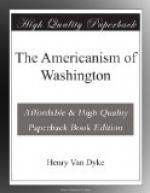Turn back to the battle of Saratoga. There were two Americans on that field who suffered under a great personal disappointment: Philip Schuyler, who was unjustly supplanted in command of the army by General Gates; and Benedict Arnold, who was deprived by envy of his due share in the glory of winning the battle. Schuyler forgot his own injury in loyalty to the cause, offered to serve Gates in any capacity, and went straight on to the end of his noble life giving all that he had to his country. But in Arnold’s heart the favorite object was not his country, but his own ambition, and the wound which his pride received at Saratoga rankled and festered and spread its poison through his whole nature, until he went forth from the camp, “a leper white as snow.”
What was it that made Charles Lee, as fearless a man as ever lived, play the part of a coward in order to hide his treason at the battle of Monmouth? It was the inward eating corruption of that selfish vanity which caused him to desire the defeat of an army whose command he had wished but failed to attain. He had offered his sword to America for his own glory, and when that was denied him, he withdrew the offering, and died, as he had lived, to himself.
What was it that tarnished the fame of Gates and Wilkinson and Burr and Conway? What made their lives, and those of men like them, futile and inefficient compared with other men whose natural gifts were less? It was the taint of dominant selfishness that ran through their careers, now hiding itself, now breaking out in some act of malignity or treachery. Of the common interest they were reckless, provided they might advance their own. Disappointed in that “ever favorite object of their hearts,” they did not hesitate to imperil the cause in whose service they were enlisted.
Turn to other cases, in which a charitable judgment will impute no positive betrayal of trusts, but a defect of vision to recognize the claim of the higher ideal. Tory or Revolutionist a man might be, according to his temperament and conviction; but where a man begins with protests against tyranny and ends with subservience to it, we look for the cause. What was it that separated Joseph Galloway from Francis Hopkinson? It was Galloway’s opinion that, while the struggle for independence might be justifiable, it could not be successful, and the temptation of a larger immediate reward under the British crown than could ever be given by the American Congress in which he had once served. What was it that divided the Rev. Jacob Duche from the Rev. John Witherspoon? It was Duche’s fear that the cause for which he had prayed so eloquently in the first Continental Congress was doomed after the capture of Philadelphia, and his unwillingness to go down with that cause instead of enjoying the comfortable fruits of his native wit and eloquence in an easy London chaplaincy. What was it that cut William Franklin off from his professedly prudent and worldly wise old father, Benjamin? It was the luxurious and benumbing charm of the royal governorship of New Jersey.




